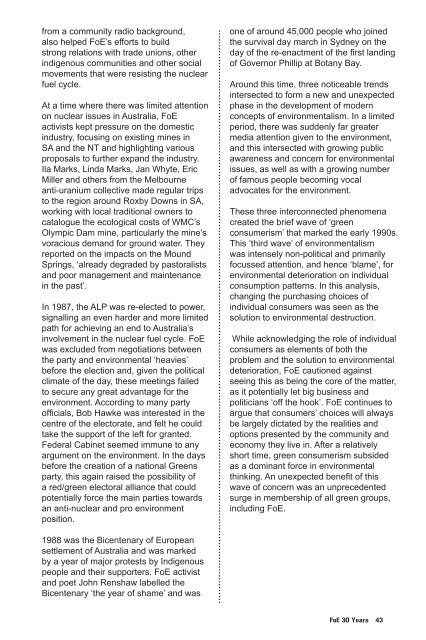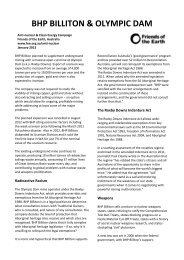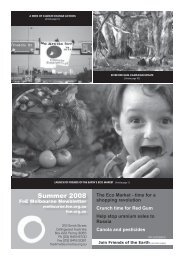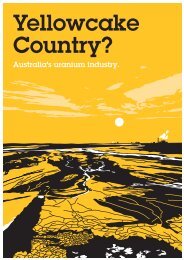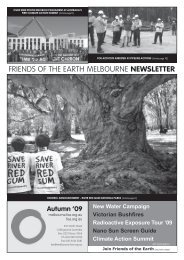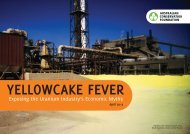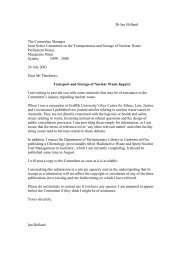Thirty Years of Creative Resistance - Friends of the Earth Australia
Thirty Years of Creative Resistance - Friends of the Earth Australia
Thirty Years of Creative Resistance - Friends of the Earth Australia
Create successful ePaper yourself
Turn your PDF publications into a flip-book with our unique Google optimized e-Paper software.
from a community radio background,<br />
also helped FoE’s efforts to build<br />
strong relations with trade unions, o<strong>the</strong>r<br />
indigenous communities and o<strong>the</strong>r social<br />
movements that were resisting <strong>the</strong> nuclear<br />
fuel cycle.<br />
At a time where <strong>the</strong>re was limited attention<br />
on nuclear issues in <strong>Australia</strong>, FoE<br />
activists kept pressure on <strong>the</strong> domestic<br />
industry, focusing on existing mines in<br />
SA and <strong>the</strong> NT and highlighting various<br />
proposals to fur<strong>the</strong>r expand <strong>the</strong> industry.<br />
Ila Marks, Linda Marks, Jan Whyte, Eric<br />
Miller and o<strong>the</strong>rs from <strong>the</strong> Melbourne<br />
anti-uranium collective made regular trips<br />
to <strong>the</strong> region around Roxby Downs in SA,<br />
working with local traditional owners to<br />
catalogue <strong>the</strong> ecological costs <strong>of</strong> WMC’s<br />
Olympic Dam mine, particularly <strong>the</strong> mine’s<br />
voracious demand for ground water. They<br />
reported on <strong>the</strong> impacts on <strong>the</strong> Mound<br />
Springs, ‘already degraded by pastoralists<br />
and poor management and maintenance<br />
in <strong>the</strong> past’.<br />
In 1987, <strong>the</strong> ALP was re-elected to power,<br />
signalling an even harder and more limited<br />
path for achieving an end to <strong>Australia</strong>’s<br />
involvement in <strong>the</strong> nuclear fuel cycle. FoE<br />
was excluded from negotiations between<br />
<strong>the</strong> party and environmental ‘heavies’<br />
before <strong>the</strong> election and, given <strong>the</strong> political<br />
climate <strong>of</strong> <strong>the</strong> day, <strong>the</strong>se meetings failed<br />
to secure any great advantage for <strong>the</strong><br />
environment. According to many party<br />
<strong>of</strong>ficials, Bob Hawke was interested in <strong>the</strong><br />
centre <strong>of</strong> <strong>the</strong> electorate, and felt he could<br />
take <strong>the</strong> support <strong>of</strong> <strong>the</strong> left for granted.<br />
Federal Cabinet seemed immune to any<br />
argument on <strong>the</strong> environment. In <strong>the</strong> days<br />
before <strong>the</strong> creation <strong>of</strong> a national Greens<br />
party, this again raised <strong>the</strong> possibility <strong>of</strong><br />
a red/green electoral alliance that could<br />
potentially force <strong>the</strong> main parties towards<br />
an anti-nuclear and pro environment<br />
position.<br />
1988 was <strong>the</strong> Bicentenary <strong>of</strong> European<br />
settlement <strong>of</strong> <strong>Australia</strong> and was marked<br />
by a year <strong>of</strong> major protests by Indigenous<br />
people and <strong>the</strong>ir supporters. FoE activist<br />
and poet John Renshaw labelled <strong>the</strong><br />
Bicentenary ‘<strong>the</strong> year <strong>of</strong> shame’ and was<br />
...................................................................................................................................................................................................<br />
one <strong>of</strong> around 45,000 people who joined<br />
<strong>the</strong> survival day march in Sydney on <strong>the</strong><br />
day <strong>of</strong> <strong>the</strong> re-enactment <strong>of</strong> <strong>the</strong> first landing<br />
<strong>of</strong> Governor Phillip at Botany Bay.<br />
Around this time, three noticeable trends<br />
intersected to form a new and unexpected<br />
phase in <strong>the</strong> development <strong>of</strong> modern<br />
concepts <strong>of</strong> environmentalism. In a limited<br />
period, <strong>the</strong>re was suddenly far greater<br />
media attention given to <strong>the</strong> environment,<br />
and this intersected with growing public<br />
awareness and concern for environmental<br />
issues, as well as with a growing number<br />
<strong>of</strong> famous people becoming vocal<br />
advocates for <strong>the</strong> environment.<br />
These three interconnected phenomena<br />
created <strong>the</strong> brief wave <strong>of</strong> ‘green<br />
consumerism’ that marked <strong>the</strong> early 1990s.<br />
This ‘third wave’ <strong>of</strong> environmentalism<br />
was intensely non-political and primarily<br />
focussed attention, and hence ‘blame’, for<br />
environmental deterioration on individual<br />
consumption patterns. In this analysis,<br />
changing <strong>the</strong> purchasing choices <strong>of</strong><br />
individual consumers was seen as <strong>the</strong><br />
solution to environmental destruction.<br />
While acknowledging <strong>the</strong> role <strong>of</strong> individual<br />
consumers as elements <strong>of</strong> both <strong>the</strong><br />
problem and <strong>the</strong> solution to environmental<br />
deterioration, FoE cautioned against<br />
seeing this as being <strong>the</strong> core <strong>of</strong> <strong>the</strong> matter,<br />
as it potentially let big business and<br />
politicians ‘<strong>of</strong>f <strong>the</strong> hook’. FoE continues to<br />
argue that consumers’ choices will always<br />
be largely dictated by <strong>the</strong> realities and<br />
options presented by <strong>the</strong> community and<br />
economy <strong>the</strong>y live in. After a relatively<br />
short time, green consumerism subsided<br />
as a dominant force in environmental<br />
thinking. An unexpected benefit <strong>of</strong> this<br />
wave <strong>of</strong> concern was an unprecedented<br />
surge in membership <strong>of</strong> all green groups,<br />
including FoE.<br />
FoE 30 <strong>Years</strong> 43


